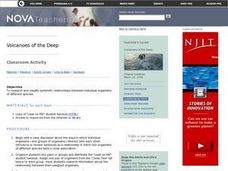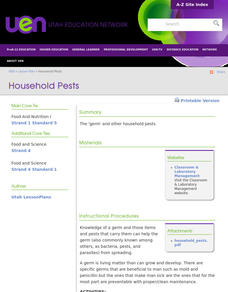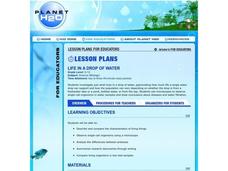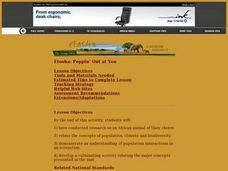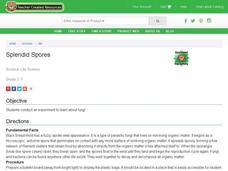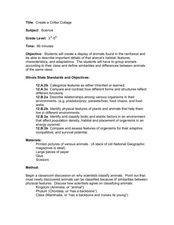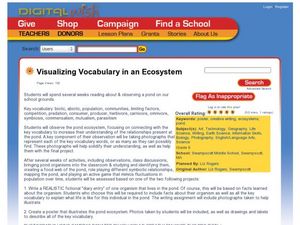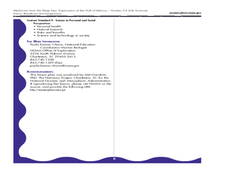Curated OER
Epidemic, Plague, and Infection
Students recognize disease vectors (pathways) and risk factors for infectious diseases.
Curated OER
Microbes and Our Food
Young scholars investigate foodborne illnesses and involved microbes. They identify major pathogens and then research and explain how they contaminate foods and how people are affected.
Curated OER
Volcanoes of the Deep
Students discuss how organisms relate to one another. They work together to research a specific organism and how it relates to other organisms. They present their findings to the class.
Curated OER
Wild Arctic
Students explore key terms, including food web and food chain. They discuss Arctic plants and animals, devise at least three Arctic food chains and create a food web showing connections among Arctic life.
Curated OER
Household Pests
Identify methods that prevent food-borne illnesses and contamination. National Standard 14.4.1 Identify food-borne illness Identify types of food-borne illness and their symptoms: botulism, e-coli, hepatitis, salmonella, staphylococci...
Curated OER
SKIN CARE: ACNE
Learners study the underlying causes, prevention, and treatment of acne.
Curated OER
Co-evolution of Plants and Pollinators
Students explore biological evolution and natural selection and its evolutionary consequences. They also explore how organisms are interdependent on one another.
Curated OER
The Monarch Watch
Students collect and examine the life cycle of monarch butterflies. They also tag butterflies and release them as part of a nation-wide project to study monarch butterfly migration.
Curated OER
Life in a Drop of Water
Students examine the structure, function, and characteristics of microscopic organisms that inhabit freshwater through collection of water samples and observation through microscopes.
Curated OER
The Red Kangaroo: An Outback Survivor
Students watch an episode of "Nature" about the "Big Red Roos." They create food chains and webs based on the information they've researched on the red kangaroos. They write an editorial on the topic of the killing of kangaroos in the...
Curated OER
Etosha: Poppin' Out at You
Tenth graders research an African animal of their choice and relate the concepts of population, climate and biodiversity to their animal. They examine how population interacts in an ecosystem.
Curated OER
Infectious Disease Detectives
Students participate in a simulation of how diseases are transmitted. Each student holds a test tube, with only one containing the "disease" while the others have water. They move around the room until told to stop. Using droppers to...
Curated OER
Trichinella Forensics
Students engage in DNA manipulation using forensics techniques. Students investigate topics involved in forensics studies such as cloning, electrophoresis, gene mapping, replication, and transcription.
Curated OER
Habitats and Adaptations
Students research and describe the habitat and adaptations of a reef animal. After the student is assigned a habitat, they design and draw a cresture adapted to eat each food and to live in each habitat.
Curated OER
Viruses and Host Evolution
Students are organized into groups of four. On Day 1 they are given a worksheet about viruses and their effects on the evolution of a rabbit population. After about 30 minutes of group work, a class discussion of the material begins. ...
Curated OER
Ah Choo!
Middle schoolers compare bacteria to viruses to find the differences. For this biology lesson, students research viruses they have been inoculated against, using the Internet. Middle schoolers complete a graphic organizer of their...
Curated OER
Splendid Spores
Young scholars explore fungi. In this fungi lesson, students take a slice of bread and leave it outside for a day. Young scholars record their observations of the fungi on the bread the following day.
Curated OER
Create a New Animal
Students understand what physical adaptations are and how they help an animal to survive. For this adaptations lesson, students research four animals and then make an original animal that has adaptations to make them survive.
Curated OER
Create a Critter Collage
Students create a collage. In this animal classification lesson, students discuss why and how scientists classify animals. Students view pictures of different animals and decide which class each animal belongs to. Students compare...
Curated OER
Visualizing Vocabulary in an Ecosystem
Sixth graders observe the pond ecosystem. In this ecosystem lesson plan, 6th graders observe the organisms at the pond and create a poster that illustrates the pond.
Curated OER
Microfriends: Medicines from the Deep Sea
Students explore the concept of beneficial microorganisms. In this microorganisms lesson, students observe different bacteria found in organisms Students discuss and describe three ways that microorganisms benefit humans.
Curated OER
What happens to water before we use it?
Learners examine how water is treated prior to becoming available for human consumption. In this water treatment lesson plan, students conduct an experiment in which they filter water. Learners formulate a hypothesis, test, analyze data,...
Curated OER
Marine Protected Areas (MPA)
Ninth graders explain the purpose of MPA's. In this biology lesson, 9th graders identify MPA's in Southern California. They simulate coastal sampling using candy from two buckets. Students analyze their results and share it with the class.
Curated OER
Food Safety Unit Exam 1
Students complete seventeen question test about food safety which includes matching vocabulary terms, short answer questions and fill in the blank questions. Test is part of the Food Safety Unit produced by the College of Agricultural...
Other popular searches
- Parasites in Taiga
- Taiga Parasites
- Animal Parasites
- Types of Parasites
- Human Parasites
- Parasites Science
- Veterinary Parasites
- Parasites Bacteria
- Life Cycle of Parasites
- Bacteria Viruses Parasites
- Hosts and Parasites
- Parasites and Agriculture




